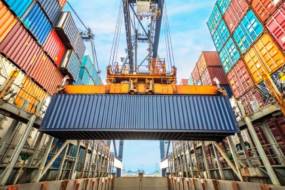BCR Consortia – Blockchain for Trade Finance
BCR’s Consortia 2019 is the first international conference to raise the profile of consortiums who are pioneering blockchain and distributed ledger technology (DLT) for trade finance to the business and financial community.
London | United Kingdom
21st – 22nd May, 2019
What is Blockchain Consortia about?
The Consortia will provide a forum for the consortiums and their prospective partners and other interested parties to showcase and evaluate their development and the future. The event will provide an opportunity for discussion on how blockchain and DLT are impacting trade finance and the business opportunities these new technologies offer to banks, funders, SMEs, government bodies, trade bodies and corporates etc.
With case studies of live transactions, examples of POCs and insights from the leading consortiums, this is not an event to be missed.
As event partners, Trade Finance Global can offer their members a 10% discount on your delegate pass rate. To register please follow this link The Trade Finance Global delegate discount code is TFG19– please utilise the code upon booking.
Alternatively you can contact yongmei.he@bcrpub.com quoting your discount code for payment via invoice.
Conference Highlights
Despite Blockchain and trade and receivables finance being one of the most talked about subject in recent months, many individuals who could be affected by it – those in trade finance banks, logistics companies, credit insurers, factoring companies, are still keen to find out more of the precise workings and differences between the many banking consortiums set up to enable blockchain (or distributed ledger technology) financing. Consortiums, such as we.trade, Marco Polo, Voltron and Komgo, all address different aspects of trade and receivables finance and work in different ways. For example, Marco Polo’s aim is to facilitate open account trade by financing both pre- and post-shipment; whereas We.Trade’s focus is to make trade facilitation easier and to finance SMEs; Voltron is involved in in the digitisation of documentary trade; and Komgo’s purpose is in enabling seamless data communication between commodity trade partners. And while both Marco Polo and Voltron use Corda technology, We.Trade uses Hyperledger Fabric and Komgo uses Etherium.
While the consortiums are keen to attract new followers, there are a number of issues and questions to be addressed by prospective bank members as well as other stake holders such as corporates, credit insurers and logistics companies:
- At what stage in development are each of the consortiums and what are they offering?
- What are their core differences?
- What are their future plans?
In addition to these most fundamental questions there are more operational aspects that require airing, such as:
- How will the consortiums connect, or interoperate with each other?
- What are the costs involved?
- What are the details of real-life example transactions so far?
- What is the state of play with developing standards and governance?
Blockchain and DLT offers revolutionary technologies in the trade and receivables finance sector, perhaps becoming the norm in the near future and making transactions faster, more secure, and cheaper. But understanding exactly what is on offer is key to assessing suitability and strategy in this rapidly developing sector.
Photos & Gallery



Related Content
VIDEO: Rethinking the customer journey for trade finance – fintech and bank collaboration View →
VIDEO: BAFT Overview of Trade Finance Compliance Issues & Challenges View →
ARTICLE: Digital Ledger Payment Commitments (DLPC) – the holy grail for standardisation? View →
What is Blockchain for Trade Finance?
Cryptocurrency is a term that has dominated the media headlines in recent years and one that most people will, by now, be at least partially familiar with. Most people associate it with things like price volatility, the dark web, and anonymity. However, few people understand how cryptocurrencies actually work. This is significant as the crypto technologies that these currencies are built on are changing the world in many other ways.
 Australia
Australia Hong Kong
Hong Kong Japan
Japan Singapore
Singapore United Arab Emirates
United Arab Emirates United States
United States France
France Germany
Germany Ireland
Ireland Netherlands
Netherlands United Kingdom
United Kingdom















Comments are closed.